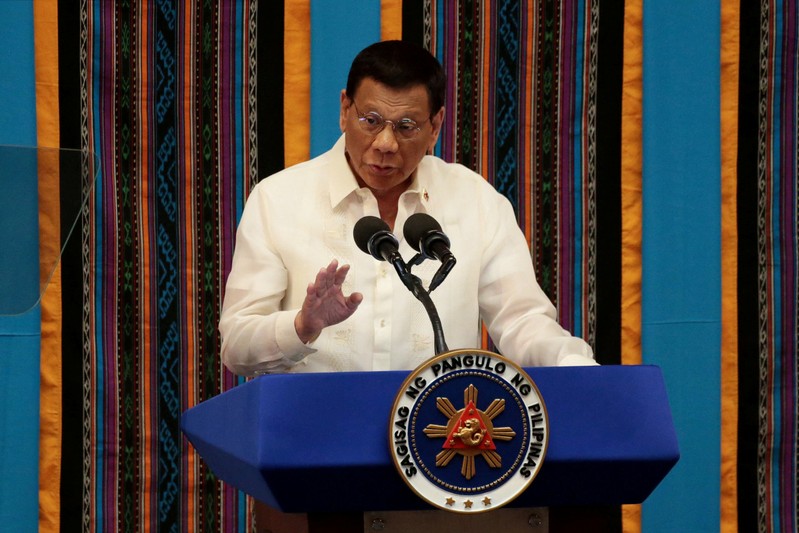
FILE PHOTO: Philippine President Rodrigo Duterte gestures during his fourth State of the Nation Address at the Philippine Congress in Quezon City, Metro Manila, Philippines July 22, 2019. REUTERS/Eloisa Lopez/File Photo
July 26, 2019
MANILA (Reuters) – Philippine President Rodrigo Duterte has vetoed a measure that would have ended companies’ practice of hiring workers on short-term contracts, his spokesman said on Friday, reneging on a campaign promise that helped put him in office.
Philippine law lets employers hire workers to meet demand at peak times by using contracts that run five months, to avoid a six-month rule that requires employers to give them permanent job status and provide health and other benefits.
“Security Tenure Bill vetoed by the president,” the spokesman, Salvador Panelo, told reporters via a messaging app, but did not elaborate on why Duterte threw out the bill, which he had called urgent in September.
Without the veto, the bill would have become law on Saturday. To override Dueterte’s veto requires a two-thirds vote of the members of each house of Congress.
Labor groups said Duterte risked losing his political capital for turning away from the workers.
“It really hurts us because this is the president’s campaign promise,” Alan Tanjusay, a spokesman of the Associated Labor Unions-Trade Union Congress of the Philippines, the country’s biggest such grouping, told news channel ANC.
“‘He said, “I need a law to address contractualization”, and now that there is a law, he vetoed the bill’,” Tanjusay added.
Both house of Congress had overwhelmingly approved the measure, despite warnings by employers’ groups and business chambers that it could do the Philippine economy more harm than good in the long term.
Not only will it raise business costs, limiting the number of people they can hired, but they said the bill would drive away investors at a time when the Philippines seeks to attract foreign capital to boost economic growth and create jobs.
Foreign direct investment of $9.8 billion into the Philippines last year is dwarfed by rivals such as Thailand and Indonesia, and the government is eager to boost the figure by slashing red tape and overhauling infrastructure.
“The passage of the bill could have a negative impact to the Philippine economy and to the workers whom the bill aims to protect”, more than a dozen business groups, including foreign business chambers, said in a joint statement this month.
“The bill impinges on management prerogatives anchored on the constitution, and it excludes contract workers hired by government agencies,” they added.
(Reporting by Karen Lema; Editing by Clarence Fernandez)

